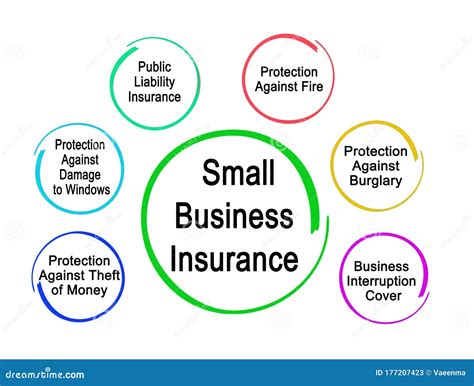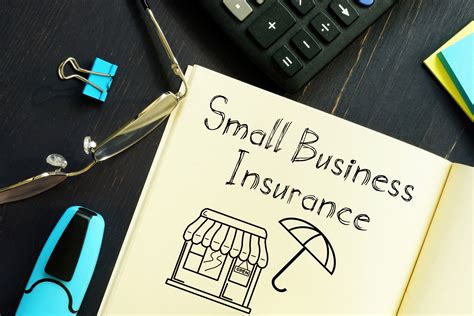Types Of Small Business Insurance

For small business owners, understanding the different types of insurance is crucial to protecting their ventures and ensuring long-term success. The insurance landscape can be complex, with various policies designed to cover specific risks. In this comprehensive guide, we'll delve into the world of small business insurance, exploring the essential types, their benefits, and how they can safeguard your business.
The Foundation: General Liability Insurance

General liability insurance is the bedrock of any small business insurance portfolio. It provides coverage for a wide range of common risks, offering protection against bodily injury, property damage, and personal and advertising injury claims. This type of insurance is especially vital for businesses that interact directly with the public, as it safeguards against customer accidents, product defects, and other potential liabilities.
Consider the case of a local café. General liability insurance would cover potential slip-and-fall accidents inside the café, as well as any damage to customers' property, like a spilled coffee damaging a laptop. It also protects the business against legal fees and potential payouts if a customer sues for an injury or property damage.
Key Benefits of General Liability Insurance
- Broad coverage for a range of common risks.
- Protects against customer accidents and property damage.
- Covers legal fees and potential payouts from lawsuits.
- Can include product liability coverage for product-related claims.
Protecting Your Business Assets: Property Insurance

Property insurance is a critical component of small business insurance, safeguarding the physical assets that are essential to your operations. This type of insurance covers damage or loss to your business property, including buildings, equipment, inventory, and furnishings. Whether your business owns or rents its space, property insurance is a must-have to protect against unforeseen events like fires, storms, or vandalism.
Imagine a small manufacturing business that suffers a fire, damaging its equipment and inventory. Property insurance would cover the cost of repairing or replacing these assets, allowing the business to resume operations quickly and minimize financial losses.
Specific Types of Property Insurance
- Building Insurance: Covers the structure of the building, whether owned or leased.
- Business Personal Property Insurance: Protects business-owned property like furniture, equipment, and inventory.
- Boiler and Machinery Insurance: Provides coverage for mechanical breakdown of boilers, HVAC systems, and other machinery.
Navigating the Digital Realm: Cyber Liability Insurance
In today’s digital age, small businesses face unique risks associated with technology and data. Cyber liability insurance is designed to protect businesses from the financial consequences of cyber attacks, data breaches, and other online threats. With an increasing reliance on technology and the sensitivity of customer data, this type of insurance is becoming an essential safeguard for small businesses.
Consider a small e-commerce business that suffers a data breach, compromising the personal information of its customers. Cyber liability insurance would cover the costs associated with investigating and containing the breach, as well as providing credit monitoring services for affected customers and covering potential legal fees and settlements.
Coverages Included in Cyber Liability Insurance
- Network Security and Privacy Liability: Covers costs related to data breaches and privacy violations.
- Media Liability: Protects against claims of defamation, copyright infringement, and other online content-related issues.
- Cyber Extortion: Provides coverage for ransomware attacks and other forms of cyber extortion.
- Business Interruption: Covers lost income and additional expenses incurred due to a cyber incident.
Ensuring Business Continuity: Business Interruption Insurance
Business interruption insurance is a critical component of a comprehensive small business insurance plan. This type of insurance provides financial protection when your business is forced to suspend or reduce operations due to a covered event, such as a fire, natural disaster, or other unforeseen circumstances. It covers lost income and ongoing expenses, helping your business stay afloat during challenging times.
Think of a restaurant that is forced to close due to a fire. Business interruption insurance would cover the lost revenue during the closure, as well as ongoing expenses like rent, utilities, and loan payments, ensuring the business can survive until it can reopen.
Key Considerations for Business Interruption Insurance
- Coverage typically includes lost income and additional expenses.
- It’s often combined with property insurance policies.
- Choose a policy with a suitable waiting period to align with your business’s needs.
Protecting Your Greatest Asset: Workers’ Compensation Insurance

Workers’ compensation insurance is a legal requirement for most businesses with employees. This type of insurance provides coverage for employees who are injured or become ill due to work-related causes. It covers medical expenses, lost wages, and rehabilitation costs, ensuring that injured employees receive the care they need and that the business is protected from potential lawsuits.
For example, if a construction worker falls from a ladder and sustains injuries, workers' compensation insurance would cover the cost of their medical treatment, as well as provide a portion of their wages while they recover.
Key Benefits of Workers’ Compensation Insurance
- Covers medical expenses, lost wages, and rehabilitation costs for injured employees.
- Protects the business from potential lawsuits related to workplace injuries.
- Can include disability benefits for long-term injuries.
Tailored Protection: Professional Liability Insurance
Professional liability insurance, also known as errors and omissions (E&O) insurance, is designed to protect businesses that provide professional services. It covers legal costs and potential damages if a client sues the business for negligence, errors, or omissions in the services provided. This type of insurance is especially important for professionals like consultants, accountants, lawyers, and healthcare providers.
Imagine a consulting firm that provides business advice to a client, but due to an oversight, the client suffers financial losses. Professional liability insurance would cover the legal costs and potential damages if the client decides to sue the consulting firm.
Specific Coverage Provided by Professional Liability Insurance
- Defense Costs: Covers legal fees and expenses associated with defending a claim.
- Liability Claims: Provides coverage for damages awarded to a client in a successful lawsuit.
- Reputation Management: Can include coverage for public relations expenses to repair the business’s reputation after a claim.
Other Essential Types of Small Business Insurance
Beyond the core types of insurance, there are several other policies that may be necessary depending on the nature of your business. These include:
- Commercial Auto Insurance: Covers vehicles owned by the business, protecting against accidents, theft, and damage.
- Product Liability Insurance: Provides coverage for product-related claims, especially important for manufacturers and retailers.
- Crime Insurance: Protects against employee dishonesty, theft, and other criminal acts.
- Key Person Insurance: Covers the financial impact of losing a key employee, ensuring business continuity.
Conclusion: Building a Comprehensive Insurance Strategy
Small business insurance is a critical aspect of managing risk and ensuring the longevity of your venture. By understanding the different types of insurance and their specific coverages, you can build a comprehensive strategy that protects your business, your assets, and your employees. Remember, insurance is an investment in your business’s future, providing peace of mind and financial security in an unpredictable world.
FAQ
What is the average cost of small business insurance?
+
The cost of small business insurance varies widely based on factors such as the type of business, location, and the specific coverages needed. On average, small businesses can expect to pay between 500 and 1,000 per year for general liability insurance. However, this can increase significantly depending on the risks associated with the business. It’s essential to obtain multiple quotes and work with an insurance professional to find the best coverage at a competitive price.
How do I choose the right insurance coverage for my small business?
+
Choosing the right insurance coverage involves a careful assessment of your business’s unique risks. Start by identifying the types of insurance that are legally required for your business, such as workers’ compensation. Then, evaluate the risks specific to your industry and location, and consider the potential impact of these risks on your operations. Work with an insurance professional to tailor a policy that addresses these risks and provides adequate protection. Regularly review and update your insurance coverage as your business grows and changes.
Can I bundle my small business insurance policies to save money?
+
Bundling your small business insurance policies, also known as a Business Owners Policy (BOP), can often result in significant cost savings. A BOP typically combines general liability insurance, property insurance, and business interruption insurance into a single policy. By bundling these policies, you not only save money but also streamline your insurance management. However, it’s important to ensure that the coverage provided by the bundled policy is adequate for your specific business needs.
What should I do if I’m unsure about the type of insurance my small business needs?
+
If you’re unsure about the type of insurance your small business needs, it’s best to consult with an insurance professional who specializes in small business coverage. They can assess your specific risks, guide you through the different types of insurance, and help you understand the coverages and exclusions of each policy. They can also provide quotes from multiple insurers to ensure you’re getting the best value for your insurance needs.
Are there any tax benefits associated with small business insurance?
+
Yes, small business insurance premiums are often tax-deductible. This means that the money you spend on insurance can reduce your taxable income, potentially lowering your tax liability. It’s important to consult with a tax professional to understand the specific tax implications for your business and to ensure you’re taking advantage of all available deductions.



